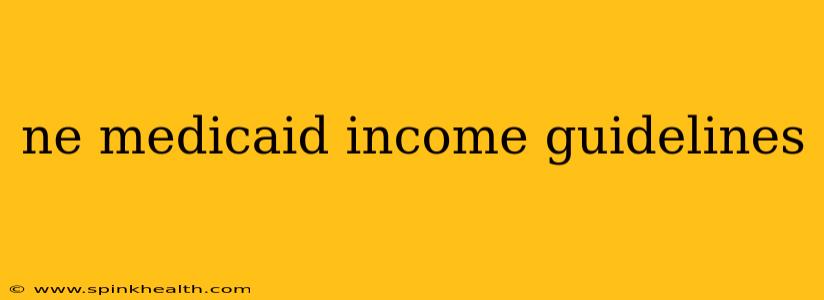Medicaid, a lifeline for millions of Americans, provides crucial healthcare coverage to low-income individuals and families. But understanding its eligibility requirements, particularly income guidelines, can feel like navigating a labyrinth. This isn't just a matter of numbers; it's about access to essential healthcare, impacting families' well-being and financial stability. Let's unravel the complexities together.
What are Medicaid Income Guidelines?
Medicaid income guidelines are the financial thresholds set by each state (with federal oversight) to determine who qualifies for the program. These guidelines aren't uniform across the country; they vary significantly depending on factors like your state of residence, family size, and age. Think of them as the financial gatekeepers to accessing crucial healthcare services. Falling below these limits usually means you are eligible, but there are other qualifying factors.
How are Medicaid Income Guidelines Calculated?
The calculation isn't a simple matter of comparing your income to a single number. It considers your modified adjusted gross income (MAGI), a measure similar to your taxable income but adjusted for certain deductions. States often use a percentage of the federal poverty level (FPL) as a benchmark. For example, a state might set its income limit at 138% of the FPL for a family of four. This percentage, along with the FPL itself, changes annually, so it's essential to consult your state's official Medicaid website for the most up-to-date information. The complexity is why using a state resource or seeking help from an expert can be crucial.
What factors affect Medicaid eligibility besides income?
While income is a primary factor, it's not the only one. Other factors include:
- Citizenship or immigration status: You generally must be a U.S. citizen, national, or qualified alien to qualify.
- Residency: You must reside in the state where you're applying for Medicaid.
- Age: Children, pregnant women, and seniors often have more lenient income requirements.
- Disability: Individuals with disabilities may qualify even if their income exceeds the standard limits.
- Pregnancy: Medicaid offers coverage during pregnancy, even if income requirements would normally exclude someone.
- Family size: The income limits differ depending on the number of people in your household.
How do I find my state's Medicaid income guidelines?
This is where dedicated research becomes vital. There's no single national source. Each state manages its own Medicaid program. To find your state's specific guidelines, I strongly advise visiting your state's official Medicaid website or contacting your state's Medicaid agency directly. These resources provide the most accurate and up-to-date information based on your location and circumstances.
What resources are available to help me understand Medicaid eligibility?
Navigating the Medicaid system can be daunting. Luckily, numerous resources can assist you:
- Your state's Medicaid agency: The primary source for information and application assistance.
- Healthcare.gov: This federal website offers information and links to state Medicaid programs.
- Local health clinics and hospitals: Many offer assistance with Medicaid applications.
- Community action agencies: These organizations often provide guidance and support for low-income individuals.
- Legal aid societies: They offer assistance for those facing legal issues related to healthcare access.
Are there different Medicaid programs within a state?
Yes, some states operate multiple Medicaid programs with varying eligibility criteria. These might include programs for specific populations like children, pregnant women, the elderly, or individuals with disabilities. Understanding these nuances is critical to ensuring you're applying for the most suitable program.
What happens if my income changes?
It is vital to report any significant changes in your income or household circumstances to your state's Medicaid agency. Failure to do so could result in the loss of coverage. Changes in income might affect eligibility, requiring a review of your application and potentially lead to adjustments in your coverage.
Navigating Medicaid income guidelines requires diligence and a willingness to seek assistance. By understanding the process and utilizing the available resources, you can increase your chances of securing the essential healthcare coverage you need. Remember, accessing this information is the first step towards securing vital healthcare for yourself and your family.

